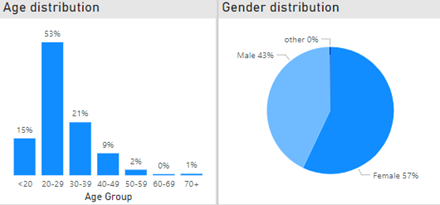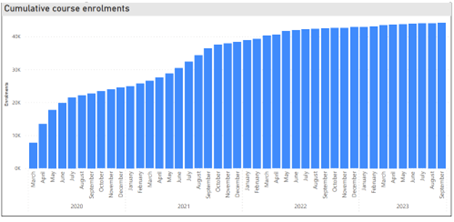Indonesia, with its diverse population and vast archipelago, faced a unique challenge in rapidly training healthcare workers during the COVID-19 pandemic. Training materials were mostly available in English, adding a language barrier in the nation’s early days of the pandemic response.
In March 2020, Indonesia reported its first COVID-19 cases, and shortly after, the World Health Organization (WHO) declared it a global pandemic. Recognizing the severity, the Ministry of Health (MoH) of Indonesia sought help from WHO to translate two key OpenWHO courses into Indonesian: eProtect Respiratory Infection and Infection and Prevention Control in COVID-19 context. The Incident Management Team led the translation efforts, and the two courses were launched on 7 March 2020.
Subsequently, WHO introduced the third Indonesian OpenWHO course on Severe Acute Respiratory Infection on 21 March 2020. As the pandemic continued, more courses were translated, resulting in a total of eleven courses by December 2020. These courses became more accessible since the links were shared through prominent websites managed by the MoH and the Indonesia Hospital Association (PERSI). In May 2021, WHO launched the Serving countries: Indonesia webpage that compiles OpenWHO courses in Indonesian, further expanding access to essential knowledge.
"WHO is committed to supporting Indonesia to strengthen the capacity of healthcare workers and effectively respond to health emergencies. We understand the critical role that language plays in accessing essential knowledge. Our collaboration with Indonesia in translating OpenWHO aims to remove language barriers and ensure that vital healthcare information reaches those on the front lines of the pandemic," said Dr N. Paranietharan, WHO Representative to Indonesia.
One notable best practice is the utilization of the COVID-19 vaccination training for health workerscourse, which was launched on 24 February 2021. This course became a prerequisite for COVID-19 vaccinators, equipping them comprehensive knowledge about vaccine types, logistical procedures, cold chain preparation, and implementation steps. The course has attracted over 11,300 participants since its inception, and became one of MoH’s key references in responding to inquiries from subnational levels concerning COVID-19.
To date, there are 14 active courses in the Indonesian language on OpenWHO, including 11 courses on COVID-19. These 14 courses have seen over 44,000 enrollments from 34,500 unique users, mainly in Indonesia.
The majority of course participants are women (57%), covering a wide age range, with 53% falling between 20-29 years old and 21% between 30-39 years old (see figure 1). In 2022, healthcare professionals made up 54% of participants, but in 2023, the distribution became more diverse, with students constituting 26%. Completion rates varied, with healthcare professionals achieving the highest rate at 78.5%, while participants from other ministries had a 68.2% completion rate.

Figure 1. Enrollment age and gender distribution of OpenWHO Indonesian courses, March 2020-September 2023

Figure 2. Cumulative enrolments of OpenWHO Indonesian courses, March 2020-September 2023
Currently, there are 8 more courses in translation: three on management of neglected tropical diseases (yaws and leprosy), two on health emergencies, and three others on tuberculosis. The courses were selected based on the need of MoH’s programmes. This ongoing collaboration is instrumental in the efforts to combat pandemic and beyond, with the goal of delivering health for all Indonesians.
Written by Maria Regina Christian, National Professional Officer for Tuberculosis, WHO Indonesia.
